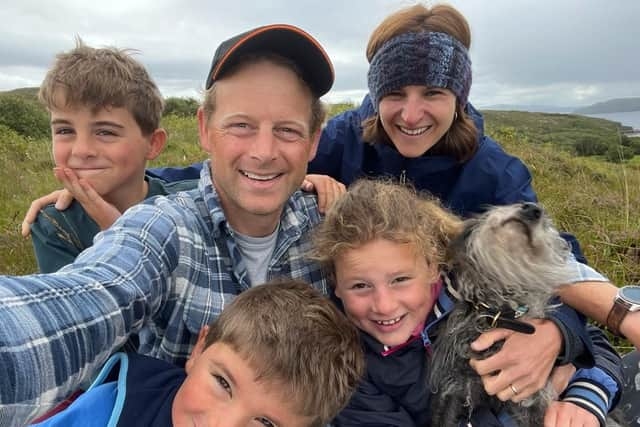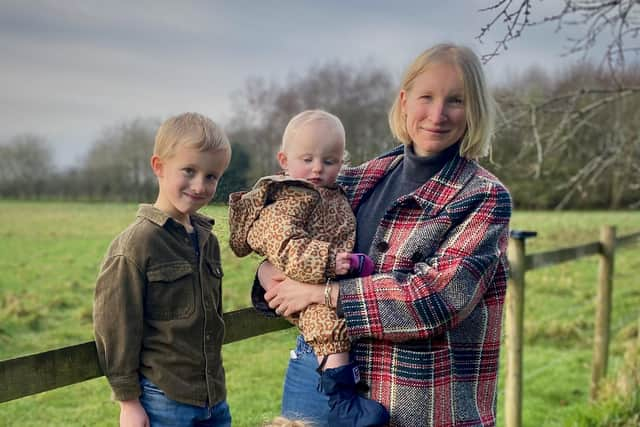Who are Scotland's next generation 'lairds' and how do they want land to be managed?
A picture framer, a coffee roaster, a skin care business with its own wildflower meadow, and a brewer. It’s not what you would first think of when you picture a “Scottish estate”.
But those are some of 15 independent local businesses that have set up shop at Preston Hall in Midlothian in the past two years. The traders' time is split between their workshops and a converted steading with a shared working space and communal kitchens.
Advertisement
Hide AdAdvertisement
Hide Ad"We have a WhatsApp group which we all communicate on,” said Will Callander, 34, who owns and runs the estate with his wife Henrietta. "We have a real community here.”


The site has been in the Callander family for the past 200 years. Having inherited what was mainly a farming and let property business about a decade ago, the couple have diversified the site’s operation.
Mr Callander is one of many next generation "lairds” whose future running of his home could be impacted by the imminent Land Reform Bill – due to be published early next year.
The Bill aims to tackle concentrated patterns of land ownership and to ensure more transparency in land management plans. Critics have said the measures are not robust enough to address inequalities in ownership, leaving communities with little control over the way local land is managed. Others, however, have said breaking up large land holdings could be a detriment to the rural economy and hinder the country reaching its nature and environment targets.
But the Scottish Government should be focusing more on the issue of land management rather than ownership, Mr Callander said.


"The question shouldn’t be ‘who owns Scotland?’”, he said. “It should be ‘how are we managing it?’
"If you asked my grandfather what his occupation was, he’d have said land owner, and historically an estate was a rent collecting, non hands-on lifestyle.
"But I call myself a land manager. It gives me no pleasure just sitting and collecting rent. We are trying to build a forestry business and develop creative workshops for other businesses to make this place resilient. It’s in our interest to keep these businesses going – for them and for us.
Advertisement
Hide AdAdvertisement
Hide Ad"If the aim is to make a more vibrant and a more engaged rural population as the Bill suggests, the emotion and polarisation that comes with land ownership discussions isn’t helping.”


The new Bill proposes a limit of 3,000 hectares on how much land an individual could own, sell or transfer, above which a public interest test would be triggered.
More than half (55 per cent) of those who answered the government consultation disagreed with this definition, with most calling for this to be lower. Some campaigners and politicians have called for the threshold to be reduced to 500 ha.
Mr Callander said he believes future policy would be better placed addressing collaboration between different land holdings, rather than breaking them up.
A recent report written by independent consultancy firm BiGGAR Economics found fragmented land use and ownership will put Scotland at risk of failing to reach its targets on rural housing and the environment.
The study, commissioned by landownership organisation Scottish Land & Estates, was backed by SNP MSP Kate Forbes, who said "delivery at scale is going to be absolutely critical if we are to achieve these targets at the required pace and quality of delivery”.
Government funding, however, is a “fundamental issue” when it comes to land and rural businesses compared to their urban counterparts, Mr Callander said.
"There isn’t the money to do what we need to do with estates, so that has to come from collaboration,” he added.
Advertisement
Hide AdAdvertisement
Hide AdNatureScot, which funds heritage and conservation projects in Scotland, was told earlier this month to brace itself for a 15 per cent cut in funding, with other rural sectors, including farming and forestry, taking a financial hit in the latest Scottish Government Budget.
‘Landownership and community are often seen as separate things; that’s not how we see it’
The importance of land management at scale was echoed by Alec Laing, a fifth-generation landowner in Morayshire.
The father-of-three runs the 1,800ha Logie Estate with his wife, Jo, and parents. The traditional Highland estate, which has sporting interests, farming and housing, has been in the family for about 100 years, but the past two decades has seen the operation diversify with tourism, energy and a timber businesses. The family employ 18 people directly and another 18 indirectly through businesses they work with.
Mr Laing said breaking up estates such as Logie would be “a disaster” for the rural economy and community.
"It’s oversimplified to say ‘you own X amount of acres, you should split it up and make it fairer’," he said. "That is an ideological position that won't work from a sustainability point of view. If you take a business, any other kind of business that’s not a land-based business, you’re not going to be carving that up between the next generation. That doesn’t happen, for a reason.
"I say this because I am not just sitting here owning land. Logie is a generational family business intertwined with other businesses and the community, and it works. Land ownership and community are often seen as separate things. That’s absolutely not how we view it here at all."
Mr Laing said it was important to not "lump all landowners together" when it comes to policy making.
"I understand where some of the negative thinking on land ownership comes from, but it really depends who you are talking to,” he said. "We are doing a lot here to contribute to what the Scottish Government refers to as its wellbeing economy.
Advertisement
Hide AdAdvertisement
Hide Ad"It would be good if policy makers realise what happens on some estates like here. It’s often not understood and not wanted to be understood by the people running the country.
"You don’t find many outwardly proud land owners because there’s a lot of language used, especially from government, that makes them conscious of how people see them. But it’s our generation that really needs to try and change that because there is a lot of positive work going on.”
When you take on land, you take on a community
Mr Laing said inheriting an estate is a big responsibility and a lot more complicated than simply owning land.
"When you take on land, you take on a community,” he added. “It’s a huge responsibility, and I think that sometimes gets forgotten about.
"Landownership is so tied up with community and history and tradition that you can’t just say ‘I own 20,000 acres and I can do what I please with it’. It’s much more complicated than that because so many others are connected to that land.
"There are procedures in place that allow community purchases to happen where there is or seems to be neglect. But here we engage a lot with the community council and the local development trust. On these active estates you probably see a lot less community buying of assets because the systems are working well. If there was an interest from the community to buy something, for example woodlands, then I would like to think that anyone could come to the estate office or pick up the phone and talk about it.
"Conversations on landownership are so divisive, but as landowners it’s definitely our responsibility to be more involved in the discussion because you can’t just hide behind your wall in your own estate. We can’t be complaining about land reform if we’re not actively explaining what we do.”
Laura Warrender, who runs Minuntion in South Ayrshire, a 800ha hill farm and sporting estate that includes tourism and woodland, said she had noticed more of an openness towards working together among her landownership peers.
Advertisement
Hide AdAdvertisement
Hide AdThe mother-of-three, who is part of a group of next generation rural business owners and managers in the south of Scotland, said she felt the country was already home to a diverse range of land ownership, be it from charities to companies, land managers to community groups. She said the key was to encourage more collaboration.
"We need a mosaic of management styles that can respond to the varied landscape of Scotland,” she said.
"I can’t shy away from the fact that I am in a fortunate position. I don’t feel compromised by that, but I don’t forget it and it makes you feel you want to do your best.
"We want to do more here, but when you look at scale, we are only a few thousand acres in a valley, so we are really looking to our neighbours to work with them to make a difference. There needs to be more focus from the Scottish Government on funding a joined-up approach between land managers.”
A Scottish Government spokesperson responded saying public investment alongside "responsible private investment” in Scotland’s environment is key to reaching the nation’s targets.
They added: “In order to help deliver our Just Transition to net zero we must ensure that increases in the level of natural capital investment also delivers benefits for local communities and wider society as a whole.
“As part of our action, we are bringing forward further land reform legislation to improve transparency of ownership, help ensure large scale holdings deliver in the public interest and empower communities by providing more opportunities to own land and have more say in how it is used.”
Comments
Want to join the conversation? Please or to comment on this article.